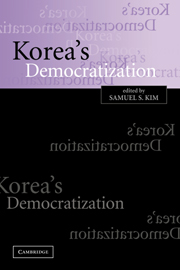Book contents
- Frontmatter
- Contents
- Tables and Figures
- Contributors
- Preface
- Part I A Framework of Analysis
- Part II Consolidation at the Mass Level
- Part III Consolidation at the Civil Society Level
- Part IV Consolidation at the State Level
- 6 Regional Politics and Democratic Consolidation in Korea
- 7 Crafting and Consolidating Constitutional Democracy in Korea
- 8 Security and Democracy in South Korean Development
- 9 The Developmental State and Democratic Consolidation in South Korea
- Bibliography
- Index
9 - The Developmental State and Democratic Consolidation in South Korea
Published online by Cambridge University Press: 29 July 2009
- Frontmatter
- Contents
- Tables and Figures
- Contributors
- Preface
- Part I A Framework of Analysis
- Part II Consolidation at the Mass Level
- Part III Consolidation at the Civil Society Level
- Part IV Consolidation at the State Level
- 6 Regional Politics and Democratic Consolidation in Korea
- 7 Crafting and Consolidating Constitutional Democracy in Korea
- 8 Security and Democracy in South Korean Development
- 9 The Developmental State and Democratic Consolidation in South Korea
- Bibliography
- Index
Summary
Since the June 29 declaration in 1987, South Korea has passed some major milestones in its march toward becoming a liberal democracy. Today, South Koreans enjoy a level of political freedom that is without precedent in their country's history. Their young democracy has endured the Asian financial crisis of 1997 and has met an important test of successfully transferring power from a ruling party to a genuine opposition party. Nonetheless, the extent to which South Korea has consolidated its democracy is open to question. South Korea has successfully institutionalized and legitimized a democratic, constitutional electoral process, but it is still struggling to establish a responsive, accountable political order and an inclusive economic system.
In this chapter, I analyze how the institutional “drag” of the developmental state, forged during the dictatorship of Park Chung Hee, has impeded democratic consolidation. Effective in early stages of economic development, the collusive arrangement between the state and giant oligopolistic conglomerates, the chaebol, has proved not only economically inefficient and anticompetitive in the era of globalization, but also deeply entrenched and reform-resistant.
I contend that, among other reasons, South Korea is having trouble consolidating its democracy because of a complex interplay of agents and structures. Notably, the attempt by Kim Young Sam to reform the South Korean developmental state was a significant contributing cause of the economic collapse in late 1997. With political resources provided by his historic election, he tried to reform the anticompetitive and antidemocratic collusive arrangement between state and big business.
- Type
- Chapter
- Information
- Korea's Democratization , pp. 220 - 244Publisher: Cambridge University PressPrint publication year: 2003
- 1
- Cited by



